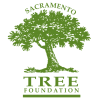Seeds for Sonoma County
December 4, 2017

Every year the Sacramento Tree Foundation focuses on growing local, native acorns into seedlings that are used for reforestation, wildlife habitat, and urban forestry projects throughout the region. This project includes many opportunities to learn and get involved including acorn harvester trainings in early fall (perfect for teachers or scout leaders), volunteer harvesting events in October, and intern positions targeted at local university students. The project has harvested between 7,000 and 15,000 native acorns each year since 2010.
Acorns are different from many seeds we interact with. Unlike beans or common garden seeds, acorns are dry fruits and cannot be stored or remain viable for more than a few months without specialized equipment. This difference is critical when it comes to planning for replanting efforts. Unfortunately, we can’t simply gather a bunch of acorns during a good year and save them for when they are needed. In order to have quality planting materials to grow our native oaks, we need to harvest seeds every year and grow them into seedlings to be available when needed.

This year we partnered with our friends at Solano Land Trust to complete a special acorn harvest outside of our normal service area to support the recovery of oak woodlands damaged during this year’s wine country wildfires. A small group of trained acorn harvesters and our acorn interns went on an amazing cross country oak ramble and harvested 3,500 acorns under a special permit at the Solano Land Trust’s Lynch Canyon property just south of the burn area of the Atlas Fire. Along with harvesting acorns for use in direct seeding projects in wine country, we also harvested for Lynch Canyon reforestation, and for acorns to be used in our Seed to Seedling classroom program beginning this January. Seedlings grown from January-June will be offered free of charge to public and private landowners for active reforestation efforts in the fall of 2018. If every Seed to Seedling classroom is successful with their acorns, we could have more than 3,000 genetically appropriate, high-quality coast live oak (Quercus agrifolia) seedlings to share with the people and wildlife affected by this disaster. If you know another classroom that would like to grow these special acorns with their students, sign up here by the end of the year.
